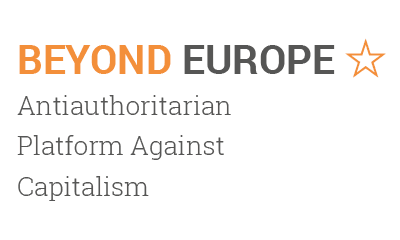Dawn of the (un)dead
An undead is haunting Europe – the undead of neoliberalism. With the outbreak of the banking and financial crisis, this kind of capitalism seemed to be ruined. Protest movements, bourgeois newspaper feuilletons, and even liberal and conservative economic ideologues suddenly complained about severe aberrations and ‘excesses of the markets’. But the sought-after change of course didn’t materialize. In some curious way, neoliberalism is staying alive. Somehow, it refuses to die.
With full speed towards abyss
In light of the collapse of the authoritarian, state-socialist regime, the neoliberal program seemed to be without alternative. Privatization, liberalization, flexibilization, deregulation – such fighting talk slogans were considered magic bullets until the 2007/08 crash. Nowadays nobody wants to be associated with them. The belief in a “free market” or in a liberalized “social market economy” that would still guarantee “prosperity for everyone” (Erhard) disappeared. The undead of neoliberalism no longer promises a glittering future.
But anyone who hoped that this disgrace of neoliberalism would lead to a general criticism of capitalistic exploitation has been disappointed. Capitalism and its ideologies once more turned out to be extremely adaptable. The massive increase of global finance markets in the past decades was and is not identified as part of a structural crisis of world capitalism. Instead, greedy managers and the exorbitance of deficit-ridden states are blamed for the huge amount of loans and liabilities and their instability and crash. Such moralistic interpretations mask even the most self-evident social policy considerations: that maybe actual wage sacrifice and tax benefits for high earners have worsened the crisis. The epochal view on the fall of the Fordist production boom after World War II, which caused, at least at times, full employment and modest mass prosperity has entirely slipped the mind. Instead of getting rid of economic growth, financed by debt, it is said that people just have lived beyond their means. This ideological explanation makes it easy to blame economically weak and dependent states on the European periphery or wage-dependent people as responsible for the enormous consequences of the crisis.
With the crash of neoliberal ideology capitalism has lost its official utopia. However, its need for capital accumulation remains. That’s why nowadays a mix of economic recipes is being thrown together in an unemotionally pragmatic way. Neoliberalism continues to exist through drives for austerity programmes and privatization, sometimes supplemented by debt breaks or rescue packages. Its institutions, rules and ownership structures are maintained and developed as a matter of course, legitimised by the incessant mantra of competitiveness: companies and locations shall compete until the end of all days.
With the assumption of there being only technical constraints, the common party political attitudes ranging from national-chauvinistic, conservative, liberal, green alternative, social democratic to state-socialistic fade into the background. Italy and Greece therefore are governed by so-called “technocrats” and “specialists” who can implement the policies of crisis management – in Europe much determined by Germany – with disregard to future elections , detached even from the very principles of democratic legitimacy.
And yet, the authoritarian continuation of the ’same-old’ does not go unchallenged. Resistance against capitalist impositions has spread most notably during the last year. As its symbol there are protest camps, occupied squares, the assembleas and the occupy-movement. For many different reasons people carried their disagreement out into the streets. Characteristic for this spontaneous protest movement were its international ambition and the claim to question the capitalist system as a whole. A major problem was their demands’ strong orientation towards state control and an often moralistic, foreshortened, nationalistic and conspiratorially grounded critique of capitalism.
The next episode…
With a European day of action on March 31, 2012 – “M31” – we want to mark the beginning of a new phase of crisis-protests. Together with political initiatives in Germany and with comrades from other European countries we call for simultaneous joint manifestations and actions. We want to connect with local fights and to overcome the national limitations of previous protests. Capitalism and its crisis are already global, our resistance is not yet.
Against the authoritarian policy of the “Troika” formed by the EU Commission, the European Central Bank (ECB) and the International Monetary Fund (IMF) we posit an emancipatory perspective: a society beyond the constraints of capitalist valorization, exploitation and competition. We want to see the end of German crisis-nationalism, with its agitation against the “Pleite-Griechen”2 and its sacrifices in favour of economic location. We want a society in which the many diverse needs of every individual take centre stagee. And we want to stand up and be counted for this aim – together with wage-dependants, the unemployed, migrants and people in education all over Europe. We know that this will take patience and stamina. M31 will not end on March 31. We’re linking up and network for lasting cooperation, and we will continue to make common cause against state, nation and capital. We expect difficult discussions and contentious issues, but we want to face political differences head-on. March 31 is a starting point for further struggle to be organized on a European level.
For March 31 we call for a nationwide joint manifestation in Frankfurt. Here, the ECB has its seat, here the Troika bargains for austerity programs and reform requirements. As European central bank of issue, the ECB is not an everyday commercial bank such as the Deutsche Bank or the Commerzbank. With its competences to make monetary policy the ECB is a central instrument of the euro-zone to secure and increase its global competitive ability, and by this means its superiority within Europe. At the same time the ECB supports the EU’s policies of sanctions against weak states, e.g. through decisions regarding the purchase (or not) of government bonds and the distribution of capital to commercial banks. This is not about bank-bashing. At the core of our critique is the systemic character of the anonymous coercion to accumulate in capitalist society, the senseless survival of an undead regime.
So let ́s shake things up! We want to make trouble in the pacified center of European capitalism. We demonstrate against the policy impositions by the EU Commission, the ECB and the IMF, together and in solidarity with all people in other countries who are fighting for a liberated society.
For an international Antinationalism! For Communism!









